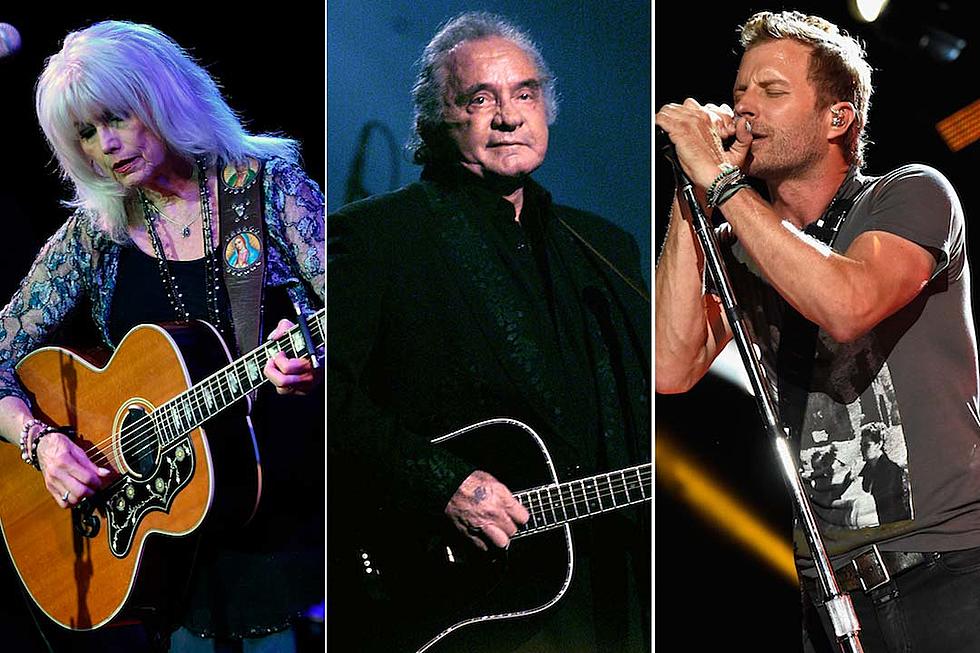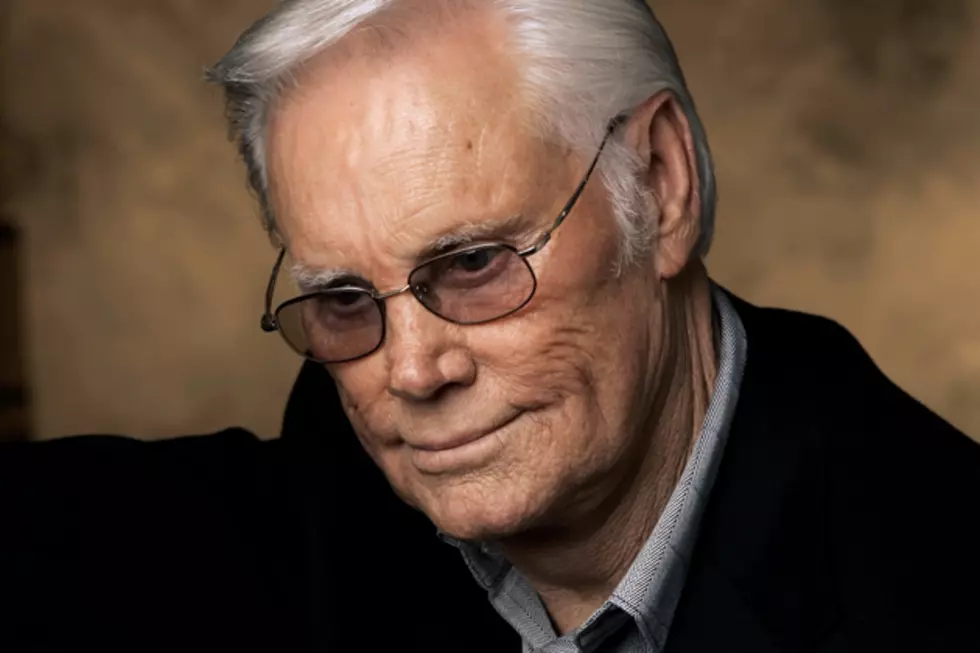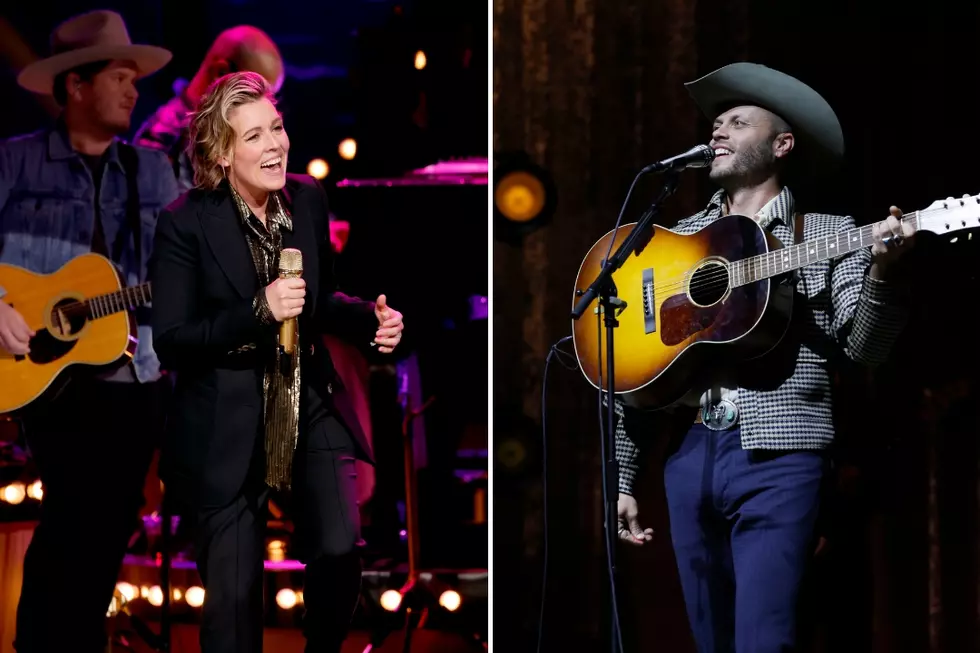
Alison Krauss & Union Station Soar Again With ‘Paper Airplane’
Alison Krauss is a spectacularly gifted vocalist, fiddle player and producer. Since her first album at age 16, each of the remarkable projects the Illinois native has been involved with over the past two-and-a-half decades, whether one of her own albums or the countless tracks she's been asked to contribute to by everyone from Brad Paisley and Dolly Parton to James Taylor and Elvis Costello, has been imbued with something profoundly ethereal -- you can't quite put your finger on it, but you know without a doubt it's special. Alison's nuanced interpretations of the work of some of the finest songwriters of our time have not only caused her fan base to expand from regional U.S. fiddle contests while she was a youngster to international stages while barely in her 20s, they have also earned the singer a record 26 Grammy awards, the most for any female artist in history.
Most recently, Alison's stunning 2007 collaboration with Led Zeppelin lead singer Robert Plant, 'Raising Sand,' garnered Grammy honors for Album and Record of the Year, among other awards. While a planned follow-up from the duo will have to wait for a while, Alison has returned to the group she has anchored since the mid-1980s. Alison Krauss and Union Station (Dan Tyminski, Ron Block, Barry Bales and Jerry Douglas) have skillfully guided bluegrass music into the 21st century and are responsible for a great deal of the genre's increased popularity in recent years.
The group's upcoming album, their first since 2004's 'Lonely Runs Both Ways' and their sixth all-new studio disc since 1989, is 'Paper Airplane,' due out April 12 on Rounder Records. The title may conjure visions of something feather-light and directionless, but the collection's overall theme, finding hope in the midst of despair, isn't exactly a carefree journey among the clouds. In the capable hands (and voices) of Alison Krauss and Union Station, the journey is one worth taking.
In this exclusive conversation with The Boot, Alison shares details of how she has evolved both professionally and personally since her first recordings as a teen phenom. She also introduces us to a few of the songwriters who contributed to 'Paper Airplane,' including one she's known her entire life.
What is the process like for you when you're looking for songs to record?
Songs come from all over the place. You can't predict what you're going to like. You might like something that doesn't fit right now. What was working for you at one point, something you've loved for years and years, when you get together with everybody, you think, this doesn't match up with what's going on with you personally. So, it gets pushed aside. Even though I'm not writing the songs, they have to be true to the time to be satisfying.
Do you usually know right away that something will be a good fit?
Sometimes I can tell by the title that it's not going to happen, if the title is too descriptive. But then you think, "Well, what if this is the exception?"
Are you listening to the melody first or to the lyrics?
Lyrics, usually. I'm better at messing around with the melody and chords, altering things to be more suitable, to make more sense to me. Lyrics are kind of the whole thing; it's the message. Something might have a beautiful melody but if it's not the truth coming out of your mouth, it's not appealing.
Do you usually have a particular theme in mind for an album or does a theme eventually just emerge?
I don't actively go, "OK, here's the theme and let's find things to go with this theme." If you're following what's speaking to you or what's making sense at the end of that record and you look back, there is a theme. It's not tangible at the start.
So, what's the theme of 'Paper Airplane'?
I'll speak for myself because the guys [in Union Station] don't really want to hear about ... they're like, "Whatever, you like it, you don't like it." [laughs] It's not something I've thought about until people ask me about it. To me, it's like being in the middle of a very trying time and knowing it will end, but at the moment you're in the middle of it.
'Paper Airplane' was written by Robert Lee Castleman. He's someone whose songs you've recorded quite a bit. How did that song find its way to you?
We recorded in July and August and I said, "We don't have it, we've got to stop and let me go look for some more things." So we took a break, and I went looking for stuff. I called R.L. and said, "Where are you?" I had known that he was in a place of being uninspired. I was lost. Sidney Cox [another frequent contributor to Alison's albums] was lost. We kept having these conversations of, "I just can't find it. Nothing is sad enough. Nothing is resounding. I'm not able to connect with these things I'm singing about," which is a very empty feeling. If you're not connecting with what you're singing, it doesn't mean the material is bad or that they aren't beautiful songs. They just weren't speaking to me yet.
When I called R.L., who's been a center of our recordings for the past 12 to 15 years, he said, "I've been going to the ocean, going to the places I used to go when I was heartbroken and I just can't find it." After a long conversation, he said, "Just come over and sit here and talk to me." So, I drove over there. When I walked in the door, he had a melody and it was 'Paper Airplane.' It was beautiful. I said, "Well, what are you gonna do now?" He said, "I'll wait." I said, "Wait for what?" [laughs] He said, "It'll be here about midnight." It's like a download for him. Completely inspired. He doesn't mess around with it, he just waits. And there it was, 'Paper Airplane.' I just loved it.
You mentioned that Sidney Cox was in the same place of feeling uninspired, but he eventually wrote 'Bonita and Bill Butler' for the album. What was happening with him?
He was sitting at the kitchen table here with his wife and he said, "I just can't write love songs. I can't do it." I said, "What do you mean?" He said, "I feel like I'm betraying [my wife]." I said, "Ah. It's not telling the truth." You have to tell the truth. He's very much into his family history. He had started this tune about a ship that his mother's family came to Louisiana on. I loved it. He had two verses, and I was going crazy every time I heard it. He's been doing this for 25 years and he's just started the period of where he's writing his best songs. Dan sings that song and he kills it.
The first time we hear Dan sing lead on the album is on the second track, 'Dustbowl Children.' What can you tell me about that song?
Peter Rowan wrote it. I've thought about that tune forever. It was on an album of his called 'Dustbowl Children' that Jerry [Douglas] had produced, like, 3,000 years ago. My brother [Viktor Krauss] would do rock versions of that song with distorted guitar! The song is just beautiful. I can just see Dan [Tyminski] standing on top of a mountain somewhere singing that song [laughs].
Your brother, Viktor, wrote 'Lie Awake' for the album. That's a gorgeous song.
He wrote that with a beautiful songwriter named Angel Snow. I was driving from Indianapolis back to Nashville, and this song came on the radio. It was a pop song and I loved the way the melody of the verse and the chorus stayed where it was, it didn't go someplace else. The thing that made the chorus the chorus was the harmony. I thought, "Oh, man, I wish we had something like that." I called my brother and asked him if he knew that song. He said, "Oh, yeah, I know that song. I sing it to my wife." I said, "Can you try and write something like that." He said, "Yeah, I think I can." Vik isn't a lyricist, so he wrote a track for it, and Angel and he got together and she wrote the lyrics. They're such beautiful, truthful lyrics.
One song on the album that has been around a while and recorded by several others is Richard Thompson's 'Dimming of the Day.' What made you decide to do that one?
I've always loved that song but I kept saying, "I can't do a Richard Thompson song! I've lost my mind!" I kept trying to find reasons why it would be OK. Like, "well, nobody in bluegrass has ever done it." I just tried to think of excuses why it would be OK.
Why do you think you've been able to have the kind of success you've had when it's so difficult for other bluegrass and Americana artists to break into the mainstream?
It's hard to say. The only thing I can say is that I'm grateful that I got to experience this whole thing with the people I've got to experience it with. I know of so many musicians that inspire me and keep me up at night that the majority of the population may never get to hear. I don't understand it, why it didn't work [for them]. They're still proud of what they're doing, it's just not on a grand scale. I know so many people that I'm losing my mind over!
Who's making you lose your mind these days?
Angel Snow is over the top. She is just beautiful. And Jeremy Lister, I love him. And Larry Sparks, always.
When you were first starting out, you had a reputation for being very meticulous in the recording studio. You've acknowledged Robert Plant for helping you have a different attitude. Why do you think you were such a perfectionist?
When you haven't had a lot of life experience, you're trying to figure out what makes something so great. When you don't know why something affects you the way that it does, you're thinking of perfection -- something that's perfect because of how it makes you feel in the fact that you can connect with it. Whether it makes you feel sad or makes you feel joyful, whatever those things are when you're listening to somebody that you love. It was just immaturity. And I don't mean that in a negative way. If you don't know what makes green, you're going to try every color combination.
If I didn't kill myself to get the vocal, it couldn't be good. You're trying to have as much control over everything that you can have control over because it's the intangible thing -- you can't explain why something is so effective. So, I'll speak for myself, when we were teenagers and working on 'Every Time You Say Goodbye,' and a couple of records after that, we were just cuckoo-birds on trying to get everything perfect, because that's what we understood. We hadn't had enough life experience to realize that that's somebody's soul that they're throwing out on the table. When you're trying to go after it ... when you're thinking, "Oh, this will make it great and this will make it great." It's great because it's someone's humanity being shared. When it's open and honest, that's when the real nature of who you are as a vocalist or as a performer, all of that stuff can finally start to become what it's supposed to be. Like a settling into yourself. It's not even a musical thing, it's a whole mindset, a whole acceptance of who you were supposed to be. Life sounds good.
More From TheBoot









